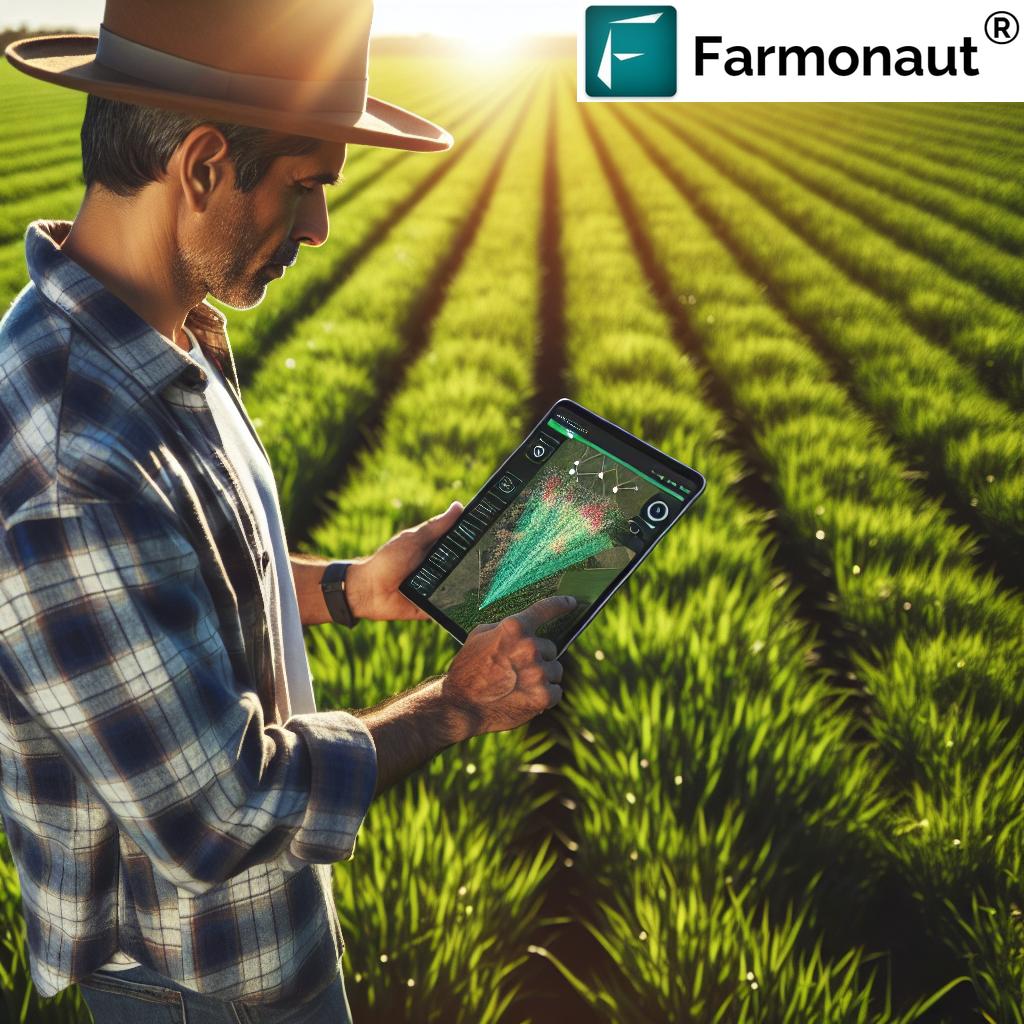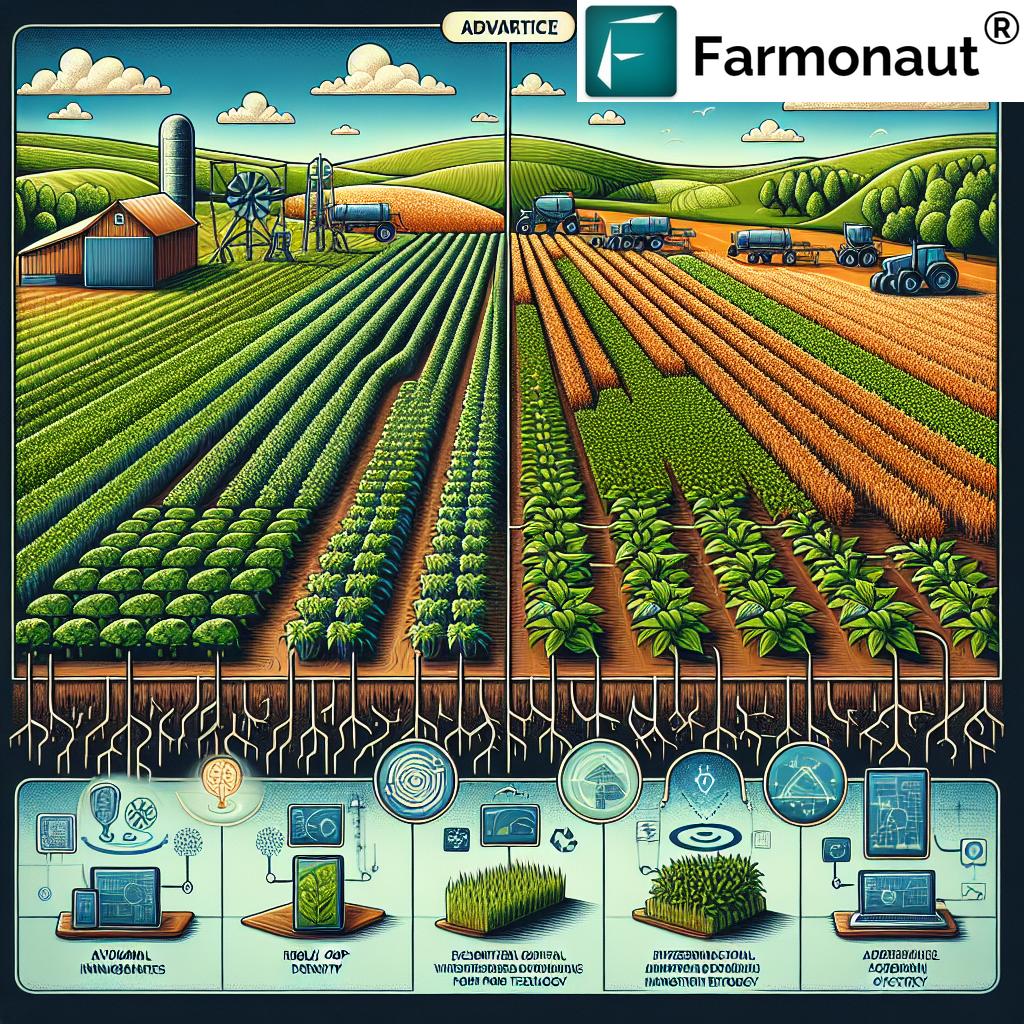
Revolutionizing Agriculture: How Digital Farming and Remote Sensing Drive Resilient Crop Yields and Sustainable Field Management
In the ever-evolving landscape of modern agriculture, we at Farmonaut are at the forefront of a digital revolution that is transforming the way farmers manage their fields, optimize crop yields, and embrace sustainable practices. As we navigate through the complexities of climate change and the growing demand for food security, our innovative approach combines cutting-edge technology with time-tested agricultural wisdom to create a more resilient and productive farming ecosystem.
The Digital Transformation of Agriculture
The agricultural sector is undergoing a profound digital transformation, and we’re proud to be leading this change. Our platform harnesses the power of remote sensing, data analytics, and artificial intelligence to provide farmers with unprecedented insights into their fields and crops. This digital approach to farming is not just about using technology for technology’s sake; it’s about empowering farmers with the tools and knowledge they need to make informed decisions that can significantly impact their yields and the sustainability of their operations.
Remote Sensing: The Eyes in the Sky
At the heart of our digital farming solution is advanced remote sensing technology. By utilizing satellite imagery and other remote sensing techniques, we provide farmers with a bird’s-eye view of their fields that was once impossible to achieve. This technology allows us to:
- Monitor crop health in real-time
- Detect early signs of pest infestations or disease outbreaks
- Assess soil moisture levels across vast areas
- Identify areas of nutrient deficiency or excess
These capabilities enable farmers to respond quickly to potential issues, optimizing their resource allocation and minimizing crop losses. The power of remote sensing in agriculture cannot be overstated – it’s like giving farmers a superpower to see beyond what the naked eye can perceive.
Data-Driven Agriculture: Turning Information into Action
The abundance of data generated through remote sensing and on-field sensors is only valuable if it can be translated into actionable insights. Our platform excels in this aspect by employing sophisticated data analysis models that process vast amounts of information to provide clear, actionable recommendations to farmers. This data-driven approach allows for:
- Precise irrigation scheduling based on real-time soil moisture data
- Optimized fertilizer application through variable rate technology
- Accurate yield predictions to inform marketing and storage decisions
- Tailored pest management strategies based on early detection
By leveraging big data in agriculture, we’re helping farmers move away from one-size-fits-all solutions to highly personalized farming practices that consider the unique characteristics of each field and crop.
Building Resilience in the Face of Climate Change
Climate change poses significant challenges to agriculture, with unpredictable weather patterns and extreme events becoming increasingly common. Our digital farming solutions are designed to help farmers build resilience and adapt to these changing conditions. By providing accurate weather forecasts and climate models, we enable farmers to:
- Plan planting and harvesting dates with greater precision
- Choose crop varieties best suited to predicted climate conditions
- Implement climate-smart agricultural practices
- Mitigate risks associated with extreme weather events
This proactive approach to climate adaptation is crucial for ensuring food security and maintaining the livelihoods of farmers in the face of environmental uncertainties.
Sustainable Field Management: Balancing Productivity and Conservation
Sustainability is at the core of our mission. We believe that productive agriculture and environmental conservation are not mutually exclusive goals. Our platform promotes sustainable field management practices that help farmers:
- Reduce water usage through precision irrigation
- Minimize chemical inputs by targeting application only where needed
- Improve soil health through data-informed crop rotation and cover cropping
- Decrease carbon footprint by optimizing machinery use and reducing fuel consumption
By adopting these sustainable practices, farmers can not only reduce their environmental impact but also often see improvements in their bottom line through reduced input costs and improved crop quality.
The Power of Connectivity in Modern Farming
Connectivity is a game-changer in modern agriculture. Our platform leverages the Internet of Things (IoT) to create a network of connected devices that continuously monitor field conditions. This connectivity allows for:
- Real-time data collection from soil sensors, weather stations, and machinery
- Automated workflows that trigger actions based on predefined thresholds
- Remote management of irrigation systems and other farm equipment
- Seamless integration of data from multiple sources for comprehensive analysis
The connected farm is more efficient, more responsive, and better equipped to handle the complexities of modern agriculture.
Empowering Farmers with Knowledge and Tools
We believe that technology is most effective when it’s in the hands of knowledgeable users. That’s why we place a strong emphasis on farmer education and support. Our platform offers:
- Comprehensive training programs on using digital farming tools
- Regular webinars and podcasts featuring agricultural experts
- A knowledge base of best practices and case studies
- Personalized support from our team of agronomists and tech specialists
By empowering farmers with both the tools and the knowledge to use them effectively, we’re fostering a new generation of tech-savvy agriculturists who are well-equipped to face the challenges of modern farming.
Innovation in Plant Breeding and Crop Development
Our commitment to agricultural advancement extends beyond field management to the very foundation of farming: seeds. We collaborate with leading plant breeders and research institutions to accelerate the development of new crop varieties that are:
- More resilient to climate stresses
- Higher yielding under optimal conditions
- Resistant to prevalent pests and diseases
- Nutritionally enhanced to address global health challenges
By integrating our digital platform with advanced plant breeding techniques, we’re helping to create the crops of the future that can thrive in changing environments while meeting the nutritional needs of a growing global population.
The Global Impact of Digital Farming
The impact of digital farming extends far beyond individual fields. On a global scale, our technology is contributing to:
- Increased food security by improving crop yields and reducing losses
- More efficient use of natural resources, particularly water
- Reduced environmental impact of agriculture
- Enhanced traceability in the food supply chain
- Improved livelihoods for farmers through increased profitability
As we continue to expand our services globally, we’re excited about the potential to make a significant positive impact on agriculture worldwide.
Farmonaut’s Digital Farming Solutions vs. Traditional Methods
| Features | Traditional Farming | Farmonaut’s Approach | Benefits |
|---|---|---|---|
| Remote Sensing | Limited to visual inspection | Satellite and drone imagery analysis | Early detection of crop issues, comprehensive field monitoring |
| Data Analysis | Manual record-keeping, limited analysis | AI-powered data analytics and insights | Data-driven decision making, optimized resource allocation |
| Yield Prediction | Based on historical averages and experience | Advanced predictive models using real-time data | Accurate yield forecasts, improved planning and marketing |
| Resource Management | Uniform application of inputs | Precision agriculture with variable rate technology | Reduced input costs, minimized environmental impact |
| Weather Monitoring | Reliance on general forecasts | Hyperlocal weather data and predictions | Better preparedness for weather events, optimized scheduling |
The Future of Farming: What’s Next?
As we look to the future, we see even greater potential for digital farming to revolutionize agriculture. Some of the exciting developments on the horizon include:
- Integration of machine learning for even more accurate predictions and recommendations
- Expanded use of drones for ultra-high-resolution field imagery and targeted interventions
- Development of AI-powered robotic systems for planting, weeding, and harvesting
- Advanced gene editing techniques to create crops tailored to specific environmental conditions
- Blockchain technology for enhanced traceability and transparency in the food supply chain
These advancements promise to make farming more precise, more productive, and more sustainable than ever before.
Join the Digital Farming Revolution
At Farmonaut, we’re committed to making digital farming technologies accessible to farmers of all sizes. Whether you’re managing a small family farm or overseeing large-scale agricultural operations, our platform can be tailored to meet your specific needs. We invite you to explore our range of services and see how digital farming can transform your agricultural practices.
Visit our app to get started with our digital farming solutions. For developers interested in integrating our technology into their own applications, check out our API documentation.
Download our mobile app:
For more detailed information on our satellite and weather API, visit our developer documentation.
Subscribe to Farmonaut
Frequently Asked Questions (FAQ)
What is digital farming?
Digital farming is the practice of using advanced technologies such as satellite imagery, sensors, and data analytics to optimize agricultural operations. It involves collecting and analyzing data to make more informed decisions about planting, irrigation, fertilization, and harvesting.
How does remote sensing benefit agriculture?
Remote sensing in agriculture provides valuable insights into crop health, soil conditions, and field variability without the need for physical inspection. It enables early detection of issues, helps in precise resource allocation, and supports data-driven decision-making.
Can digital farming help small-scale farmers?
Absolutely! Digital farming tools can be scaled to suit farms of all sizes. For small-scale farmers, these technologies can lead to significant improvements in yield and efficiency, helping to increase profitability and sustainability.
How does Farmonaut ensure data privacy and security?
We take data privacy and security very seriously. All data collected through our platform is encrypted and stored securely. We adhere to strict privacy policies and give farmers full control over their data, including the ability to delete it at any time.
What kind of support does Farmonaut offer to farmers?
We provide comprehensive support including training on how to use our platform, regular webinars and educational content, and personalized assistance from our team of agronomists and tech specialists. Our goal is to ensure that farmers can fully leverage the power of our digital farming tools.
How does digital farming contribute to sustainable agriculture?
Digital farming promotes sustainability by enabling precise resource management, reducing waste, and minimizing the environmental impact of agricultural practices. It helps farmers use less water, fewer chemicals, and optimize their operations for long-term soil health and biodiversity.
Can Farmonaut’s solutions be integrated with existing farm management systems?
Yes, our platform is designed to be flexible and can integrate with many existing farm management systems. We also offer APIs for custom integrations, allowing farmers and agribusinesses to incorporate our data and insights into their current workflows.
How accurate are the yield predictions provided by Farmonaut?
Our yield predictions are based on advanced models that consider multiple factors including historical data, current field conditions, weather patterns, and crop health indicators. While no prediction is 100% accurate, our models have shown high levels of reliability and continue to improve as we gather more data and refine our algorithms.
What types of crops can be monitored using Farmonaut’s platform?
Our platform is capable of monitoring a wide range of crops, including grains, fruits, vegetables, and cash crops. We continually expand our capabilities to include more crop types and adapt our algorithms to different growing conditions around the world.
How does Farmonaut help farmers deal with climate change?
We provide farmers with tools to adapt to changing climate conditions, including accurate weather forecasts, climate-smart agricultural recommendations, and data to support resilient farming practices. Our platform helps farmers make informed decisions to mitigate risks associated with climate variability.
As we continue to innovate and expand our digital farming solutions, we remain committed to our mission of empowering farmers with the tools and knowledge they need to thrive in the modern agricultural landscape. By embracing technology and data-driven practices, we believe that agriculture can meet the challenges of the 21st century, ensuring food security, environmental sustainability, and prosperity for farming communities around the world.

